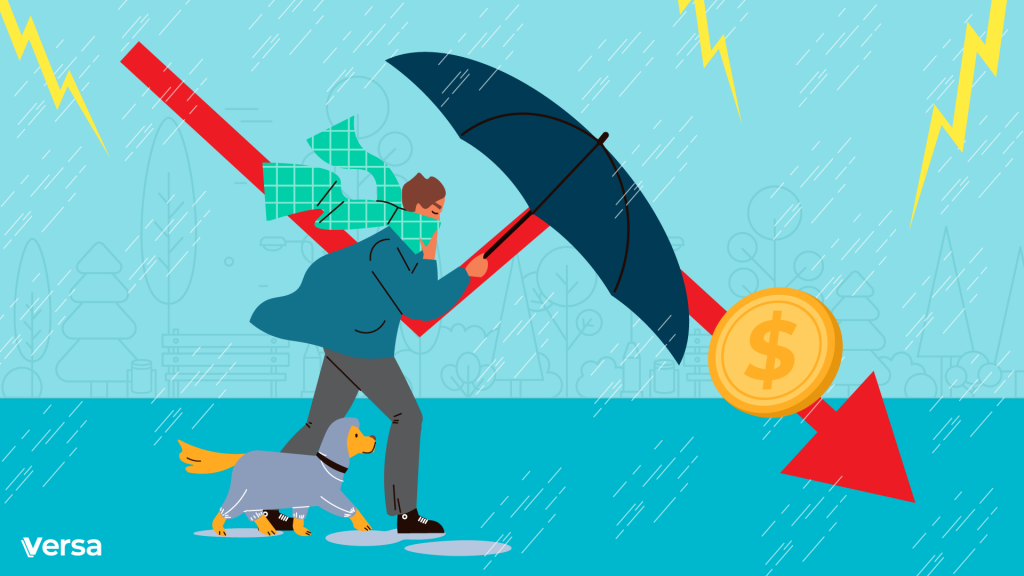
Recession sounds like a big word and it is.
But what exactly is it? For many millennials and Gen Z who did not live through a recession, it may be difficult for us to fully understand the extent of it.
What is Recession?
First off, you need to know what inflation is. Simply put, inflation is when the overall cost of living increases.
Imagine inflation as a bonfire. Some inflation is good, but too much inflation is like a raging bonfire.
Now if the bonfire isn’t controlled, it’ll turn into a forest fire. It’s harder to put out with much more at stake. A forest fire that will either burn a few trees before dying off or continue burning until all we’re left is a wasteland.
That’s what recession is.
As we know, inflation leads to a higher cost of living. A recession, on the other hand, can be a mild decrease in economic activity in a country that lasts months. It can also be a long-lasting downturn with global consequences that last years – or anything between.
During a recession, the economy struggles, people lose work, companies make fewer sales, and the country’s overall economic output declines.
Will there be a recession in Malaysia this 2022?
Well, the answer has been rather mixed. With rising inflation and supply chain problems across the world, there have been concerns of recession in the US and China. Because both countries make up more than 20% of Malaysia’s trade volume combined, Malaysia will suffer the economic impact if either country faces a recession.
A common telling sign that a recession is coming is an increase of unemployed people. However, unemployment has continued to decline steadily with several sectors reopening after the COVID-19 lockdown, including in the US. According to the Department of Statistics Malaysia Official Portal, Malaysia’s unemployment rate dips below 4% for the first time since the onset of the COVID-19 Pandemic.
But with inflation on the rise and the market downturn, there have been signs of consumers spending and investing less. Which could be bad news for the economy.
At the very least, we should expect a downturn.
What can we do during a recession?
We certainly cannot stop a recession or downturn from happening. Spending more in hopes of spurring the economy is out of the question.
But we can focus on softening the impact.
1. Keep calm and save more ?
We have no idea of how long the recession will last. With recession, there’s always the possibility of lay-offs as companies try to cut down loss. Job searching will be a challenge and this means we will need to shift from having 3 – 6 months of savings to 6 months – a year.
We know, easier said than done. One way to bulk up your cash reserves is to rebalance your budget. Try looking into what you can cut out or opt for a cheaper alternative.
2. Resist emotional investing decisions ?
It’s tempting to withdraw everything out. However, the odds of timing the market is low.
Stick to your investment plan and make sure that your portfolio matches your risk tolerance and time horizon. This way you won’t be tempted to pull from the market prematurely. You can also opt for low-risk investments including investing in mutual funds such as Versa Cash or allocating additional savings into EPF.
4. Pay off your debts ??
Repaying your debts will be an added burden when you suffer the impact of a recession; say a layoff. Repaying your debt ensures that you have less financial commitments. If you’re struggling to save and can’t find a budget that works for you, try the 50/30/20 rule.
5. Invest in your skills ?
Finding a job during a recession is close to impossible. Instead of seeking a new job or a side income, find ways to reskill or upskill. This way, you will always be in-demand.
6. Find your support system ?
Job losses and financial struggles can take a toll on our mental health. Having professional support can help alleviate that stress. Luckily, Malaysia is working towards making mental health help more accessible. It’s never too late to start getting the help you need.

